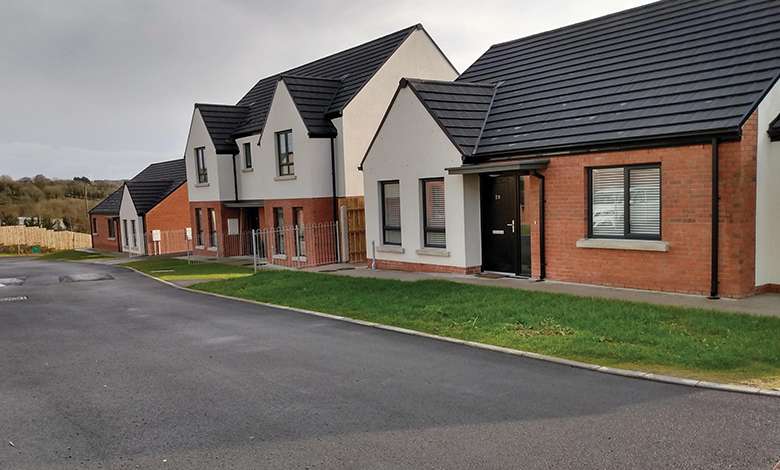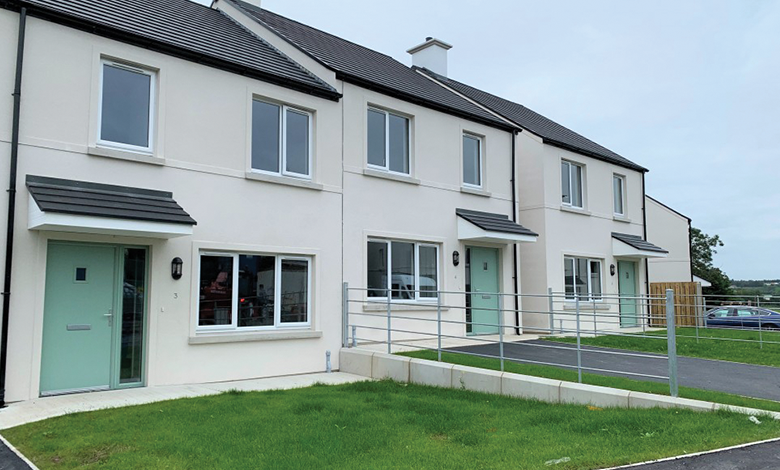Housing Executive: Steps forward with Housing for All

Delivery of the Housing for All programme by the Housing Executive is built on a foundation of shared housing delivery, demonstrating that the future of Northern Ireland will be based on communities where people of all backgrounds and cultures can thrive together, writes Chief Executive, Grainia Long.
The 25th anniversary of the signing of the Belfast/Good Friday Agreement is a timely opportunity to assess progress made by successive Northern Ireland administrations, in developing cohesive and shared communities across Northern Ireland.
There is no doubt that huge progress has been made in building thousands of homes to house people from a range of backgrounds who choose to live together as a community. However, genuine mix in new developments remains a work in progress.
February 2024 will mark another milestone as the Housing Executive assumes overall responsibility for operational delivery of the Housing for All programme. We have much to build on.
In the years following the signing of the Agreement, 29 new shared housing estates have been established and we have worked with partners and communities across Northern Ireland to embed good relations and build strong, safe, inclusive neighbourhoods.
The Agreement contained a specific pledge “to facilitate and encourage integrated education and mixed housing” as an essential element in the process of reconciliation and the creation of “a culture of tolerance at every level of society”.
With a wealth of experience in working with communities at local level and across the whole of Northern Ireland, the Housing Executive and housing associations have been at the forefront of delivering this pledge in social housing estates.
While this is a policy objective for the Northern Ireland Executive and the housing sector, it is something that the vast majority of people here aspire to. The 2022 Northern Ireland Life and Times Survey indicated that 74 per cent of people would prefer to live in a mixed-religion neighbourhood.
The Shared Housing Programme was introduced to improve housing choice and tackle barriers that prevent people living in shared and balanced communities. The programme had its origins in the Northern Ireland Executive Together: Building a United Community (T:BUC) developed in 2013. The programme reflected the Executive’s continued commitment to improving community relations and continuing the journey towards a more united and shared society and represented a major change in the way that good relations is delivered across government.
The housing element was delivered through the Department for Communities and the Housing Executive, with the department having responsibility for securing funding and scheme identification in partnership with us and with housing associations.
The initial phase of 10 shared neighbourhoods was supported through The Executive Office, through T:BUC.
The delivery of shared housing has since been included in the draft Programme for Government 2016 – 2021 and in Fresh Start (2015), and New Decade, New Approach (2020) agreements, reflecting the importance of the programme in supporting and sustaining inclusive homes and communities across Northern Ireland.
The Shared Housing Programme is currently delivering 76 shared housing developments, of which 33 developments (1,038 homes) have completed and 43 developments (1,477 homes) are either under construction or programmed to start.
These flourishing neighbourhoods give us a strong foundation on which to build. They demonstrate that the future of Northern Ireland will be based on communities where people of all backgrounds and cultures can thrive together.
As the regional housing authority we are ideally placed to take this work forward, and are excited by the potential to the roll-out of the next chapter of shared housing development in Northern Ireland with the Housing for All programme.
Our extensive involvement and experience in community cohesion, community safety, working with local communities, assessment of housing needs, regional place shaping teams located in Belfast, Craigavon, and Derry/Londonderry and our management of the delivery of the social housing development programme reinforces that we have the skills and processes to deliver and further develop Housing for All.
A key change for the sector will be a strategic approach to site identification at a pre-programme stage. We will embed the Housing for All philosophy across key strands of our business to ensure links are developed across community planning and local development plan activity, latent demand testing in rural areas, and city and town centre living.
The programme also aligns strongly with our vision that everyone is able to live in an affordable, sustainable, and decent home, appropriate to their needs, in a safe and attractive place. We are committed to ensuring that housing is openly accessible to all and that everyone can make decisions on where to live, confident in their place within the community.


We will continue to put people at the centre of housing with a focus on delivering on objective need, underpinned by principles of fairness, equality and good relations.
Our community cohesion, community safety and good relations support will ensure sustained involvement with our neighbourhoods as they develop their own inclusive, bonded and integrated community.
Placing the stewardship and operational responsibility for Housing for All in the Housing Executive, demonstrates the trust and confidence both the Department for Communities and The Executive Office has for our organisation, its people and its ability to build on the success of the programme.
The Housing for All programme has a huge part to play in creating inclusive, safe, and sustainable neighbourhoods that will help to shape a more integrated, diverse, vibrant and stable society. We look forward to driving this change, in the interests of our communities.
Housing Executive
T: 03448 920 900
E: information@nihe.gov.uk
W: www.nihe.gov.uk






